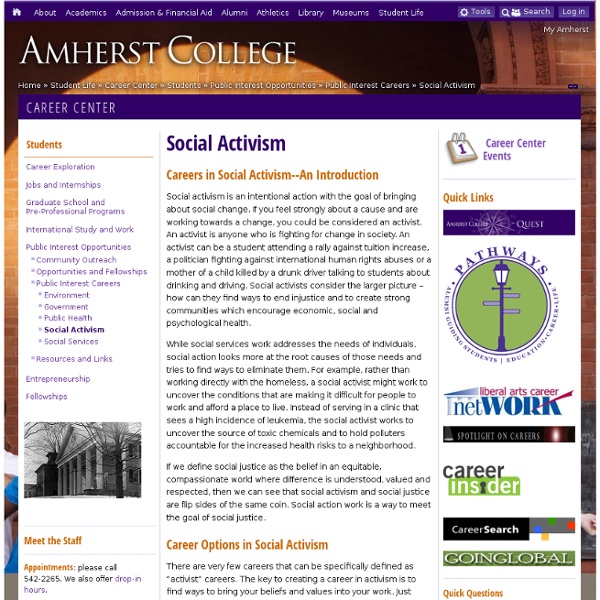Worldwide social activism demanding change
By Graham Peebles Change is afoot. Confronted with state corruption and corporate greed, abuse of human rights, environmental chaos and extreme levels of economic and social injustice, the people, overwhelmingly the young, are taking to the streets demanding change and a new political/economic system that is inclusive and just.
Famous Activists
Game Show Host, Reality Television Star, Film Actor/Film Actress (1972–) Jenny McCarthy was named Playboy's 1994 Playmate of the Year and hosted MTV's 'Singled Out' from 1995 to… Author, Philanthropist (1811–1896) Harriet Beecher Stowe was an author and social activist best known for her popular anti-slavery novel Uncle… Singer, Songwriter, Activist, Philanthropist (1951–) Bob Geldof is best known as the singer of the band the Boomtown Rats and for his political activism, particularly his…
Social Media Made Tunisian Uprising Possible
New America Media, News Analysis, Jalal Ghazi, Posted: Jan 14, 2011 Editor’s Note: In the last month, Tunisia, known by Amnesty International as having one of the Arab world’s most repressive governments, has seen a surge of public outcry and protest – the worst political crisis in Tunisia since the current president, Zine el Abedine Ben Ali, began his now 24-year-long presidency in a 1987 bloodless coup. The demonstrations began on December 17, after a 26-year-old impoverished college graduate, publicly self-immolated in front of a government building in protest against authorities' confiscation of his only means of income: an illegal vegetable vending cart. When Mark Zuckerberg founded Facebook, he was not necessarily thinking of providing a platform for Arab protestors to express their frustration with hunger, unemployment and corruption. Nor was he planning for his website to become the battlefield between Tunisian authorities and web activists.
social activists
The only constant thing is change. The physical, biological and human environments are in a continual state of flux. Individuals react to change in patterns laid down by their society and culture. These patterns change through time.
What is social media
Social media is the collective of online communications channels dedicated to community-based input, interaction, content-sharing and collaboration. Websites and applications dedicated to forums, microblogging, social networking, social bookmarking, social curation, and wikis are among the different types of social media. Here are some prominent examples of social media:
Twitter Revolution: How the Arab Spring Was Helped By Social Media
As a result of the many technological advancements and innovations that have revolutionized how individuals communicate, an abundance of information has become available to everyone. Depending on where the information is found, however, it’s reliability can be questioned. With the growing number of international, self-described (both non-for-profit and for-profit) organizations such as Facebook, Wikipedia, Wikileaks and more, much of the information provided is now often opinionated and biased, nonetheless, truthful. Ultimately, public information supplied by social networking websites has played an important role during modern-day activism, specifically as it pertains to the Arab Spring. In Arab countries, many activists who played crucial roles in the Arab Spring used social networking as a key tool in expressing their thoughts concerning unjust acts committed by the government.
Activism, social and political
Published in Gary L. Anderson and Kathryn G. Herr (eds.), Encyclopedia of Activism and Social Justice (Thousand Oaks, CA: Sage, 2007), pp. 19-27 Brian Martin
Why Social Media Is Reinventing Activism
The argument that social media fosters feel-good clicking rather than actual change began long before Malcolm Gladwell brought it up in the New Yorker — long enough to generate its own derogatory term. “Slacktivism,” as defined by Urban Dictionary, is “the act of participating in obviously pointless activities as an expedient alternative to actually expending effort to fix a problem.” If you only measure donations, social media is no champion. The national chapter of the Red Cross, for instance, has 208,500 “likes” on Facebook, more than 200,000 followers on Twitter, and a thriving blog. But according to the Chronicle of Philanthropy, online donations accounted for just 3.6% of private donations made to the organization in 2009. But social good is a movement still in its infancy.



